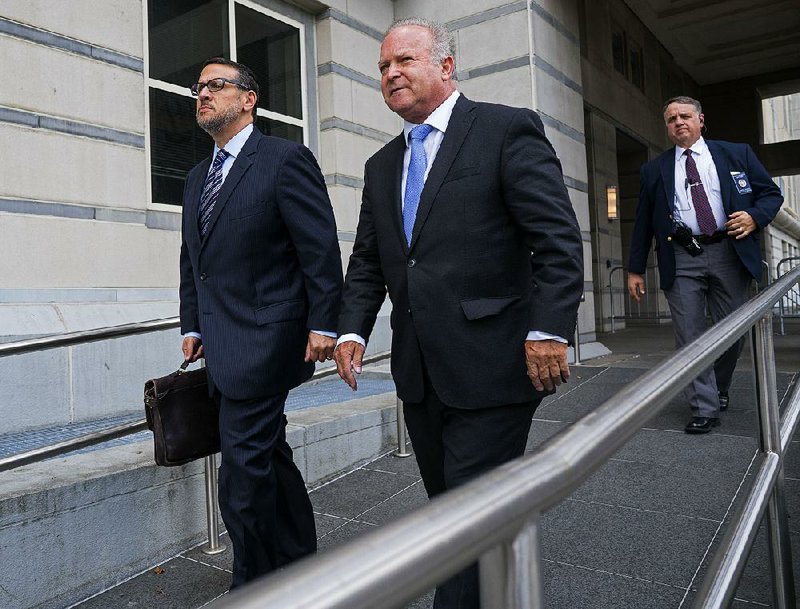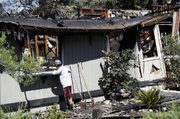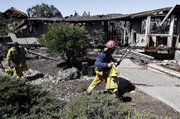Sentence probation for ex-Christie aide
NEWARK, N.J. — A former political blogger and high school classmate of Gov. Chris Christie’s who masterminded the 2013 George Washington Bridge lane-closing scheme was sentenced Wednesday to three years of probation.
David Wildstein of Sarasota, Fla., faced 21 to 27 months in prison under a plea agreement, but federal prosecutors asked that he get probation after his testimony last fall helped convict former Christie staff member Bridget Kelly and Wildstein’s former supervisor, ex-Port Authority of New York and New Jersey executive Bill Baroni.
The three “put our faith in a man who neither earned it nor deserved it,” Wildstein said. “I willingly drank the Kool-Aid of a man I’d known since I was 15 years old.”
The three closed access lanes to the bridge, among the busiest in the world, during a week in September 2013 to cause gridlock in Fort Lee, whose Democratic mayor had declined to endorse the Republican governor’s re-election. Wildstein received an email from Kelly that read, “Time for some traffic problems in Fort Lee.”
Kelly was sentenced in March to 18 months in prison, and Baroni was sentenced to 24 months. They have appealed their convictions.
FDA panel favors new leukemia therapy
A panel of cancer experts Wednesday recommended approval of what could become the first gene therapy available in the U.S.
The Food and Drug Administration advisory panel voted 10-0 in favor of an advanced leukemia treatment developed by the University of Pennsylvania and Novartis Corp. The FDA usually follows recommendations of its expert panels but isn’t obligated to do so.
The therapy could be the first of a wave of treatments custom-made to target a patient’s cancer. Called CAR-T, it involves removing immune cells from a patient’s blood, reprogramming them to create an army of cells that can zero in on and destroy cancer cells, and injecting them back into the patient.
The vote came after lengthy discussion and impassioned pleas from the fathers of two young patients whose lives were saved by the therapy. The one-time leukemia treatment would be for children and young adults with the most common form of childhood cancer, known as ALL.
Ryan set to move Russia sanctions bill
WASHINGTON — House Speaker Paul Ryan pledged Wednesday to pass a Russia sanctions bill, an effort that has stalled because of a constitutional issue.
“I’m a Russia hawk,” said Ryan, R-Wis. “We want to move this Russia sanctions bill.”
The sanctions legislation, which also would hit Iran with new economic penalties, passed with 98 votes in the Senate but stalled in the House after the GOP cited a constitutional requirement that legislation involving revenue start in that chamber.
House Democrats late Wednesday introduced the original Senate bill as a House measure, a move they said would settle the constitutional question and retain bipartisan oversight of potential sanctions relief.
Sen. Bob Corker, R-Tenn., chairman of the Foreign Relations Committee, urged the House to act quickly. He said “dillydallying” that has slowed the bill’s passage in the House has amounted to “a ridiculous waste of time.”
Crews in West boxing in wildfires
OROVILLE, Calif. — Firefighters all around the U.S. West finally saw some real progress Wednesday, surrounding once-fierce blazes and allowing evacuees to start heading back home.
Officials on Wednesday downgraded the number of structures threatened by a Northern California fire from several thousand to roughly 600. Authorities surveying the damage said at least 41 homes and 55 other buildings had been destroyed near the town of Oroville.
Some residents had returned home after fleeing the flames in the foothills of the Sierra Nevada, about 60 miles north of Sacramento, but thousands remained evacuated as the fire entered its fifth day.
The blaze burned nearly 9 square miles and injured four firefighters. Officials said the fire was more than half contained Wednesday.
In Colorado, crews started to wind down the fight against a wildfire that temporarily forced hundreds of people to evacuate near the resort town of Breckenridge.
In Arizona, recent monsoon rains helped stop the growth of a wildfire in mountains overlooking Tucson, and an evacuation order for the summer-retreat community of Summerhaven has been lifted.



